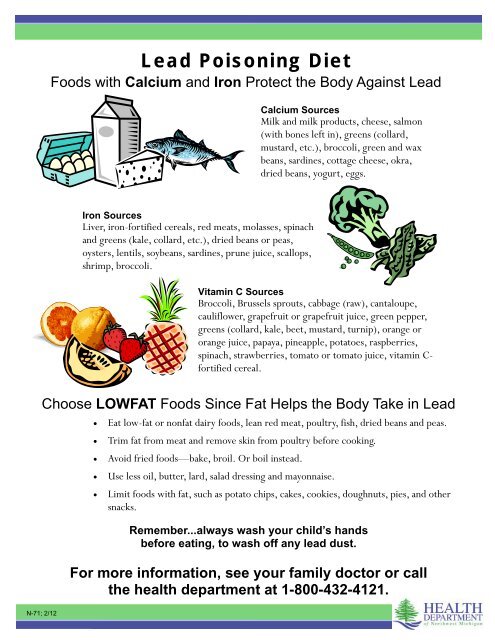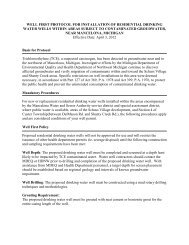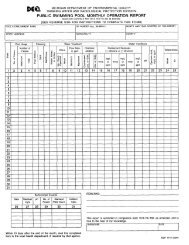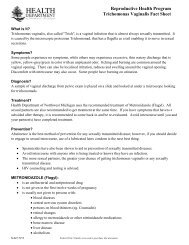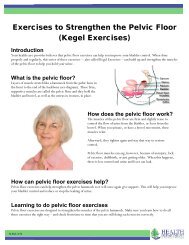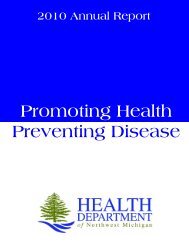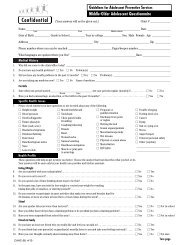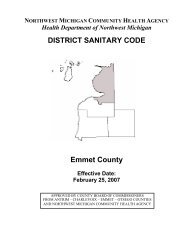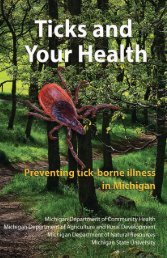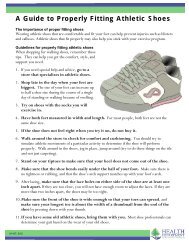Create successful ePaper yourself
Turn your PDF publications into a flip-book with our unique Google optimized e-Paper software.
<strong>Lead</strong> <strong>Poisoning</strong> <strong>Diet</strong><br />
Foods with Calcium and Iron Protect the Body Against <strong>Lead</strong><br />
Calcium Sources<br />
Milk and milk products, cheese, salmon<br />
(with bones left in), greens (collard,<br />
mustard, etc.), broccoli, green and wax<br />
beans, sardines, cottage cheese, okra,<br />
dried beans, yogurt, eggs.<br />
Iron Sources<br />
Liver, iron-fortified cereals, red meats, molasses, spinach<br />
and greens (kale, collard, etc.), dried beans or peas,<br />
oysters, lentils, soybeans, sardines, prune juice, scallops,<br />
shrimp, broccoli.<br />
Vitamin C Sources<br />
Broccoli, Brussels sprouts, cabbage (raw), cantaloupe,<br />
cauliflower, grapefruit or grapefruit juice, green pepper,<br />
greens (collard, kale, beet, mustard, turnip), orange or<br />
orange juice, papaya, pineapple, potatoes, raspberries,<br />
spinach, strawberries, tomato or tomato juice, vitamin C-<br />
fortified cereal.<br />
Choose LOWFAT Foods Since Fat Helps the Body Take in <strong>Lead</strong><br />
<br />
<br />
<br />
<br />
<br />
Eat low-fat or nonfat dairy foods, lean red meat, poultry, fish, dried beans and peas.<br />
Trim fat from meat and remove skin from poultry before cooking.<br />
Avoid fried foods—bake, broil. Or boil instead.<br />
Use less oil, butter, lard, salad dressing and mayonnaise.<br />
Limit foods with fat, such as potato chips, cakes, cookies, doughnuts, pies, and other<br />
snacks.<br />
Remember...always wash your child’s hands<br />
before eating, to wash off any lead dust.<br />
For more information, see your family doctor or call<br />
the health department at 1-800-432-4121.<br />
N-71; 2/12
11 Steps to Protect Your Child from <strong>Lead</strong><br />
Do A Home Survey<br />
1. Check for loose paint and plaster. Don’t forget closets, behind beds, and outside. Have a professional<br />
make most repairs. Children and pregnant women must leave home while repairs are being made.<br />
2. Remove paint chips and dust from inside windows and window sills.<br />
3. Keep your home dust-free. Use door mats. Damp mop, damp dust, and vacuum at least once a week.<br />
4. Remove painted toys if they were made outside of the USA. Remove old painted furniture.<br />
5. Run the water from the faucet at least two minutes before drinking it in the morning, and if you have<br />
been away from home all day. Never use water from the hot water faucet for cooking or making baby<br />
formula.<br />
6. Cover the dirt in your yard with grass, ground cover, or shrubs with wood chips underneath them.<br />
Help Your Child Avoid <strong>Lead</strong><br />
7. Feed your child at least three nutritious meals every day on a regular schedule. Children need foods with<br />
calcium (milk, cheese, yogurt), iron (iron-fortified cereal, green leafy vegetables), and protein (lean meat,<br />
fish, poultry). Stay away from fried and fatty foods. A proper diet helps protect your child from lead<br />
poisoning.<br />
8. Do not store food or formula in opened cans.<br />
9. Teach your child not to put things in his or her mouth.<br />
10. Wash your child’s hands and face before each meal, snack, and bedtime. Clean toys and pacifiers often.<br />
Don’t Bring <strong>Lead</strong> Into Your Home<br />
11. If you or other family members work where there is lead, change your work clothes and shoes at the work<br />
place. If possible, shower before going home. Wash work clothes separately. If you have a hobby that uses<br />
lead, follow the same precautions, and don’t do the hobby at home .<br />
In addition to these home safety measures, every child under the age of six should be screened for lead poisoning<br />
at least once a year. For more information, see your family doctor or call the health department at:<br />
1-800-432-4121<br />
www.nwhealth.org<br />
N-71; 2/12


